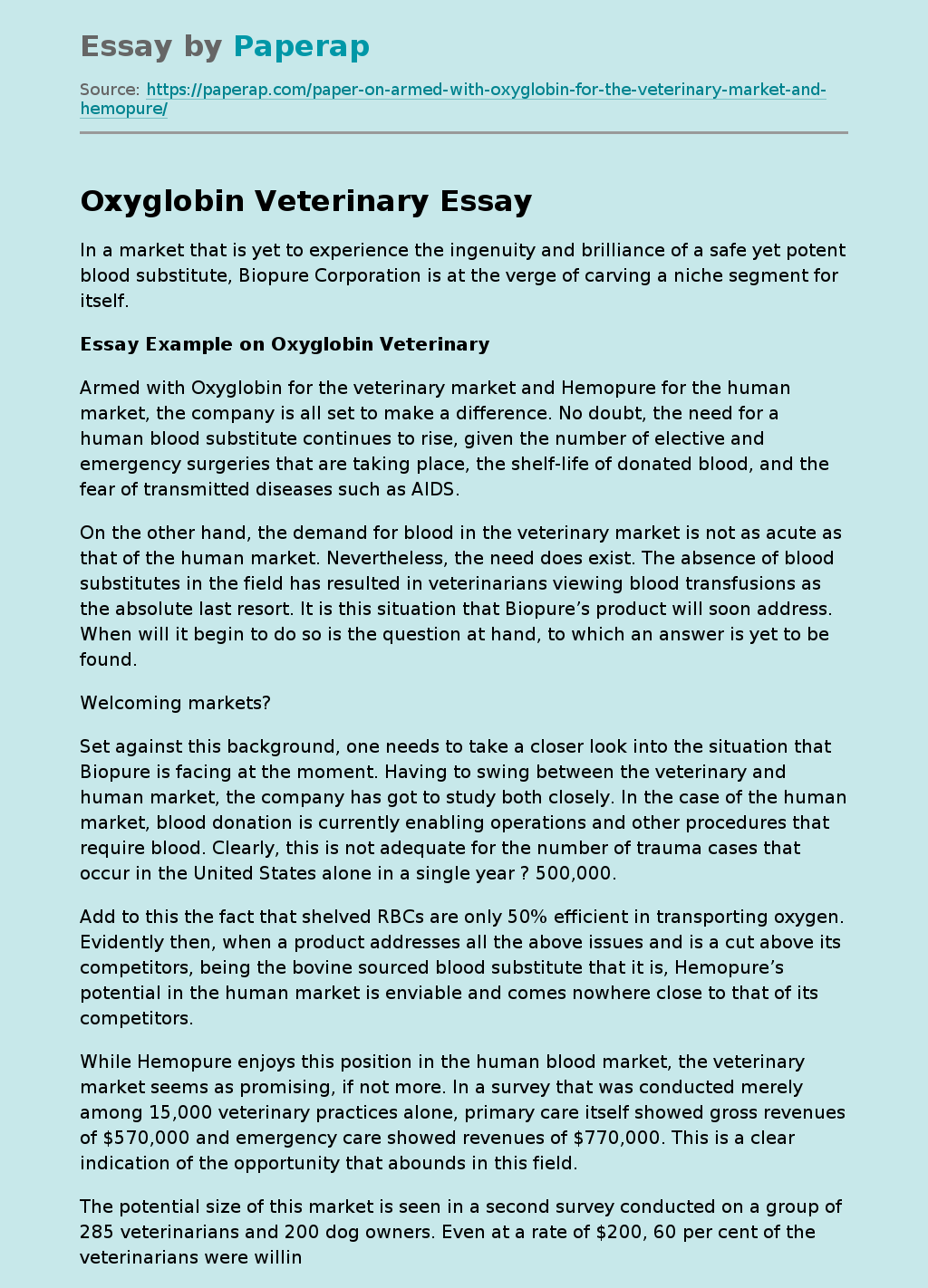Oxyglobin Veterinary
In a market that is yet to experience the ingenuity and brilliance of a safe yet potent blood substitute, Biopure Corporation is at the verge of carving a niche segment for itself.
Essay Example on Oxyglobin Veterinary
Armed with Oxyglobin for the veterinary market and Hemopure for the human market, the company is all set to make a difference. No doubt, the need for a human blood substitute continues to rise, given the number of elective and emergency surgeries that are taking place, the shelf-life of donated blood, and the fear of transmitted diseases such as AIDS.
On the other hand, the demand for blood in the veterinary market is not as acute as that of the human market. Nevertheless, the need does exist. The absence of blood substitutes in the field has resulted in veterinarians viewing blood transfusions as the absolute last resort. It is this situation that Biopure’s product will soon address. When will it begin to do so is the question at hand, to which an answer is yet to be found.
Welcoming markets?
Set against this background, one needs to take a closer look into the situation that Biopure is facing at the moment. Having to swing between the veterinary and human market, the company has got to study both closely. In the case of the human market, blood donation is currently enabling operations and other procedures that require blood. Clearly, this is not adequate for the number of trauma cases that occur in the United States alone in a single year ? 500,000.
Add to this the fact that shelved RBCs are only 50% efficient in transporting oxygen. Evidently then, when a product addresses all the above issues and is a cut above its competitors, being the bovine sourced blood substitute that it is, Hemopure’s potential in the human market is enviable and comes nowhere close to that of its competitors.
While Hemopure enjoys this position in the human blood market, the veterinary market seems as promising, if not more. In a survey that was conducted merely among 15,000 veterinary practices alone, primary care itself showed gross revenues of $570,000 and emergency care showed revenues of $770,000. This is a clear indication of the opportunity that abounds in this field.
The potential size of this market is seen in a second survey conducted on a group of 285 veterinarians and 200 dog owners. Even at a rate of $200, 60 per cent of the veterinarians were willing to opt for Oxyglobin. More interestingly, and an important factor to consider while setting the price for Oxyglobin, is 65% of dog owners were willing to pay $400 for blood transfusions in critical operations. The size of the veterinary market clearly wasn’t going to be a problem for Biopure Corporation. It was large, it was accepting and definitely, it was waiting for the product to release.
Painting the present picture…
However, Biopure’s success in the human market is largely dependant on a few factors that have been pointed out and wisely at that, by certain employees. To begin with, the problem of what goes before what arises in the case of Hemopure and Oxyglobin.
While some at Biopure Corporation are of the opinion that Oxyglobin should hit the market first, some others believe that it would be wiser for Hemopure to be the first to arrive. If Oxyglobin were to be Hemopure’s predecessor, it would cause a series of challenges, the first of which would begin with pricing. While Oxyglobin is priced at a mere $150 per unit, Hemopure is priced at a slightly ambitious $600 to $800 per unit. It could be perceived as a similar product and the high price would be severely debated, causing an unnecessary stir.
Oxyglobin Veterinary. (2019, Nov 27). Retrieved from https://paperap.com/paper-on-armed-with-oxyglobin-for-the-veterinary-market-and-hemopure/

